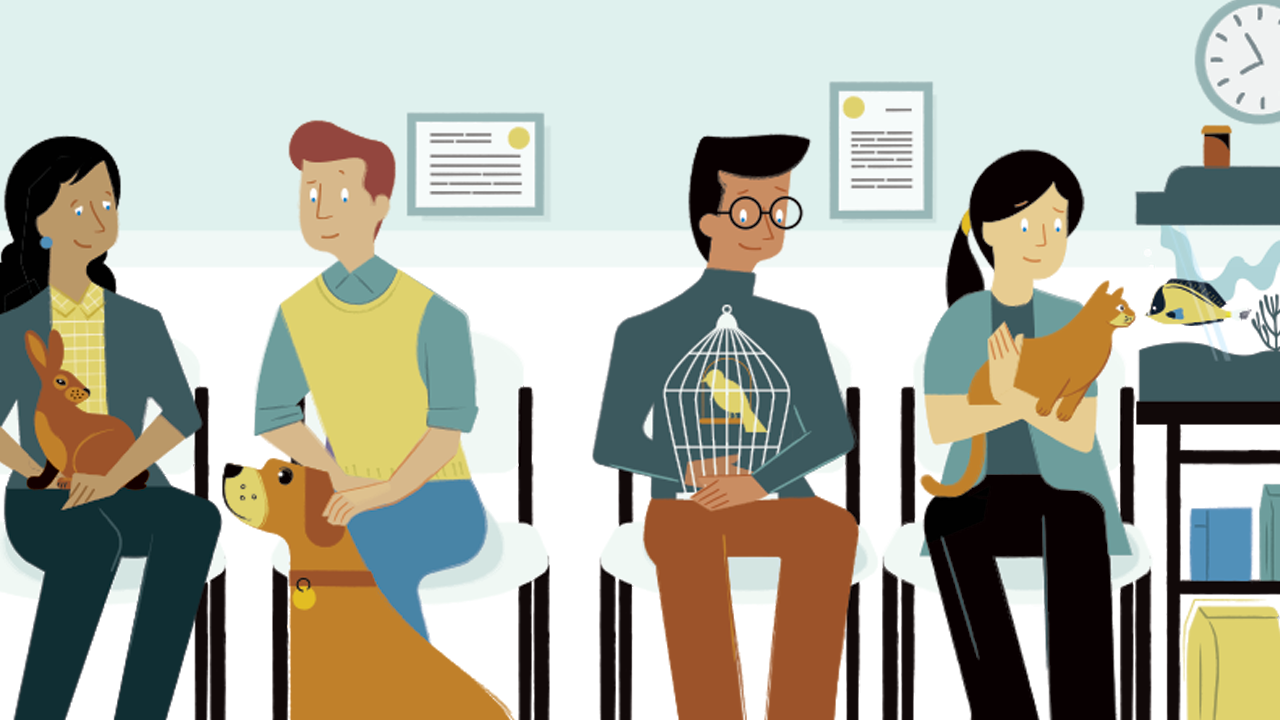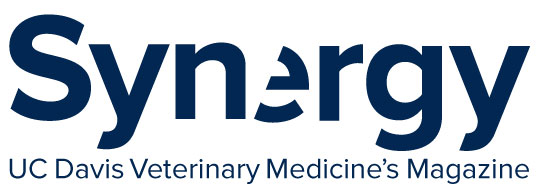


emand for veterinary care continues to rise. From hamsters to horses, more than 65% of U.S. households owned at least one pet in 2023. The combination of increased pet ownership, rising standards of care, the perspective of pets as family members, and a shortage of veterinary healthcare workers means that appointments are often scheduled weeks, if not months, in advance. When it comes to veterinary care, a little planning can go a long way.
Drs. Jessica Morgan and Ilana Halperin offer tips to help you and your pet get the most out of your visit.

Make the visit positive
Whether a veterinarian visit is for routine care or because something is wrong, it can be stressful. Pets may not be accustomed to leaving their home or may be uncomfortable travelling. Finding time to acclimate pets, especially cats, to car rides can be daunting, but training your pet to ride quietly and safely in the car means a less stressed pet upon arrival. Similar to small animals, horses and livestock that are accustomed to traveling, and are easy to load and unload, will be less stressed if they have to come in to the clinic.
For large animal field service visits, catch and halter your animal(s) or put them in an easily accessible holding area before the vet arrives. Plan extra time if they are hard to catch so that they are calm at examination time. Let your veterinarian know if you do not have shelter or power, or if you are uncomfortable handling your animal for the procedures to avoid unsafe situations or logistical delays.
If your pet is fearful, consult with your veterinarian about whether an anti-anxiety medication is appropriate. “These medications take the edge off so we are able to do a physical exam safely, and your pet has a better experience,” said Halperin. “There are some things we can do when they have a little bit of medication that we couldn’t do otherwise.”
Training your pet to ride quietly and safely in the car means a less stressed pet upon arrival. If your pet is fearful, consult with your veterinarian about whether an anti-anxiety medication is appropriate.
Preventative Care
It is easier and less expensive to prevent health problems than to treat them. Preventive care can help extend the quality and length of a pet’s life. If your veterinarian can see you regularly and knows what is normal for your pet, it is easier to observe when something has changed. It also helps with formulating individualized care plans.
“We would love to see them once a year, even if you feel like everything is going well,” said Halperin. “An annual physical exam can pinpoint things early on.”
Issues such as dental problems and infectious diseases are easy to prevent and hard to treat in most species. Talk to your vet about vaccinations, parasite prevention, and dental care so they can formulate a plan that is best for your situation.
“We would love to see them once a year, even if you feel like everything is going well. An annual physical exam can pinpoint things early on.”
Be Prepared
A comprehensive patient history is an important part of a veterinary visit for any species. Gather pertinent information about the following areas prior to the appointment so you can provide the most accurate information.
Travel
Offer information about recent travel. Different diseases are prevalent in different areas. Heartworm, for example, is more common in the Southeast, whereas salmon poisoning is seen in the Pacific Northwest. Animals that participate in competitions and events may also be exposed to infectious diseases.
“Travel history for competition horses is really helpful because it helps us fill out the paperwork (like health certificates) appropriately and get you where you want to go,” said Dr. Jessica Morgan, an assistant professor in Equine Field Service.


Your Pet's Job
Let your veterinarian know about special activities for your animals. Recommendations for your pet’s care will be different if they are a lap dog versus a hunting dog, an indoor cat versus a barn cat, or a trail horse versus a show horse.
Parasite Prevention
Include information about parasite (flea, tick, etc.) prevention and the number of other pets in the household.
“While we don’t want to deviate into the other pets’ problems, if you’re not putting flea prevention on your cat, your dog is still going to get fleas,” said Halperin.
For horses and livestock, information about the deworming program is helpful for assessing individual and herd health.


Behavior
It is easy to become accustomed to our pet’s behaviors and they seem normal to us. However, some “quirks” might indicate anxiety or a physical disease problem.
“If you notice changes in personality, such as anxiety, hiding, eating at different times, pacing at night, barking or meowing more, it is worth bringing up,” said Dr. Ilana Halperin, chief of the UC Davis Small Animal Clinic Primary Care Service. “It may alert us to check on something that could be a serious health issue.”

Food
Share with your veterinarian what kind of food your animal eats, how much, and how often. “Food is one of the more important things for a number of medical conditions,” said Halperin.
Medication
Write down any medications that the pet receives, along with the dose and frequency. This should be done by the person that actually administers the medications, which may be different from the person that is present at the appointment.

Goals and Expectations
Your veterinarian wants to be a good fit for both you and your pet. Let them know how involved you want to be and if other people will be caring for the pet. Be honest about habits like brushing the pet’s teeth and how much time you have to exercise your pet.
“We want to get to know you and what you do with your animal companion so we are able to meet each other’s expectations,” said Morgan. “Tell us what you want to accomplish with your pet so we can talk about how to keep them healthy.”

Behind the Scenes at UC Davis
For patients at the UC Davis veterinary hospital, visits may look a little different than they do at a private practice. UC Davis trains the next generation of veterinarians, so veterinary students and residents are integral in all steps of the process. This means that appointments can be lengthy. However, the client also often receives multiple physical examinations of their pet(s), a review of the case by several people, and makes important contributions to the future of the profession. More eyeballs on a pet may offer more chances of identifying issues or important second opinions.
In the teaching model, veterinarians rotate on and off services so they gain experience in different areas. For example, residents usually rotate off a previous service and onto a different service every month. As a result, clients may receive follow up communication from a different veterinarian than the one they interacted with initially. It is important to know that the faculty members, residents, and students all discuss cases together and stay up to date to facilitate accurate communication.
Clients of the UC Davis veterinary hospital have access to cutting-edge technology and services that allow our board-certified faculty veterinarians to provide the best care possible. Your partnership with our veterinary teams also helps them continue to be innovators of the some of the latest advancements, while training the next generation of general practitioners and veterinary specialists.
For Appointments:
- 530-752-1393
(small animal clinic) - 530-752-0290
(large animal clinic) - 530-752-9618
(large animal field service)
